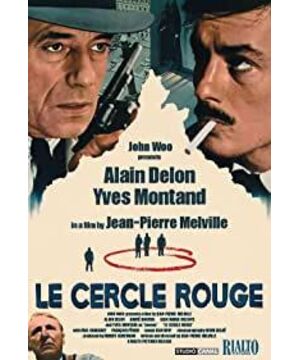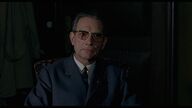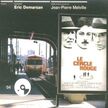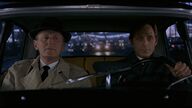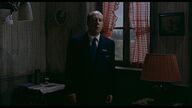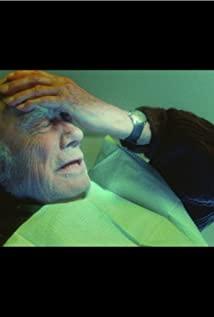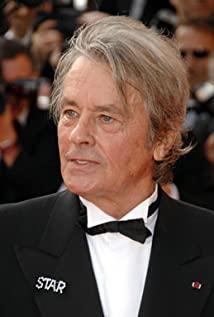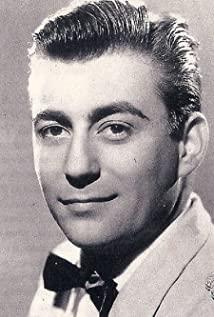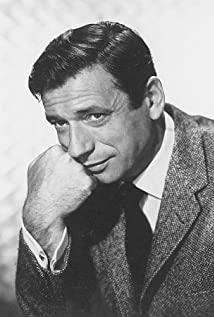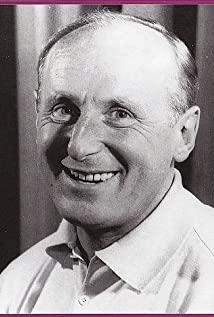"Everyone is guilty, and even if it didn't exist at the beginning, there will be soon."
These words the chief of police said to the inspector were obviously the finishing touches of "Red Circle" and set a sadness for the whole movie. The tone.
Recently, two movies have fascinated me, one is "Big Buddha Mountain" and the other is "Red Circle", both of which can be regarded as a model of lifting heavy weight. The two directors Kihachi Okamoto and Melville are extremely skilled in various formal methods. They just came to their feet, and they told an intriguing story in a grim style. The characters are between good and evil. The meaning is It is looming, but after watching it, it makes people addicted to it like smoking opium. I just want to know more about these two films, and more. Regarding "Big Buddha Ridge" I know that Dongyuxijun has written a lot of words to explain it, so I had to try to talk about "Red Circle", but unfortunately I didn't have time to delve into it, just as the movie fans were talking to themselves after they were shocked. Bar.
The name "Red Circle" comes from a passage quoted from the beginning of the film by the 19th-century Hindu saint Rama Krishna: The Buddha once drew a circle with a red pen and said: "When people are destined to meet, even if they know nothing, No matter what happened to them, no matter how different the roads are, on that day, they will meet unexpectedly in Chihuan."
This passage, like "everyone is guilty", constitutes the tone of "Red Circle", that is, "destiny" "And "original sin". Everyone in the film is guilty, including the so-called white roads such as the police, while the black and white people walked into the "red circle" following their own destiny and started a contest between will and belief.
As a purely male drama, the four male protagonists (yes, including the policeman) in the film have their own brilliance, and they are all full of personalities. In order to survive after being released from prison, Alan Delon, who played Gore, agreed to a prison guard's request and robbed a jewelry store on parole. He is the promoter of the whole plan, determined and resourceful, with a moustache, Alan Deron, as Melville’s love general, does not need extra words at all, just wrap in a trench coat and stare with mocking eyes. Sweeping around, the image of a lone traveler wandering on the edge of order has already appeared on the screen. It is simply a French version of "pirate handsome" Chu Liuxiang. You don’t need acting skills to be cool. For an idol actor like Alan Delong, it’s no better to cooperate with Melville. In contrast, although Wu Yusen's movie is the lingering vein of Mei's movie, it is fierce and bloody. Naturally, it is necessary for an actor like Zhou Yunfa to be able to support it.
If Gore’s image is a polite noble and gentleman, Fogo, played by Frontier, is a rude grass bandit. In the first half of the escape scene in the film, he is promoted by a detective + a police school student + a police dog + The plane's hunting net was chased by chicken feathers and duck blood, and rushed into the trunk of Gore's car. Once such a reckless character meets the "marshal among thieves, son among thieves", the dramatic effect will naturally come out. What is rare is that both of them are men of love and righteousness. After saving each other's life, they began to sympathize with each other (note that there is no emotion can not help), and they commit crimes together. One detail is particularly interesting. In that famous 20-minute robbery scene, Gore and Fogo pass by a statue of a naked girl. Gore keeps his eyes open, but Fogo jumps up and touches his chest. The character of the two is portrayed. The style of "Red Circle" is cold, but it is so cold that it is interesting and tasteful, without a casual note. In the end, Fogo kicked open the door to rescue Gore, the feelings were already gushing out, and it could be intoxicating.
People who have watched "Red Circle" may forget all the characters in the play, but they will not forget the sniper Ran Sen. The role played by Yves Montan is definitely the most glamorous and charismatic character in the film. This outstanding policeman, full of passion and justice, was depressed in the police circle all his life, and finally ended up in a small apartment to spend his remnant life after retirement. From the surreal scene after drinking alcohol, you can see how deeply the director sympathizes with this character. By the way, although the scene showed the hallucinations of Ran Sen's demons, it seemed not to match the realistic style of the whole film, but it was the same cold and powerful, and the masters really did not stick to the form.
Unlike the other two accomplices, Ran Sen participated in the robbery not for money, but purely for regaining himself and defeating the demons. Under the planning of Gore, he performed the most "technical" part of the whole robbery: using a pewter bullet to penetrate the keyhole at a long distance and open the door. I have no doubt that Ran Sen's free and easy sway in this scene directly inspired the excitement of A Lang in "Hot Detective" opening the underground garage with a single shot. But Yves Mondant’s performance after this is really amazing. He opened the bottle and sniffed through the mask. Although he couldn’t see the expression, I believe it was absolutely intoxicated, not just opening the jewelry library. More importantly, the old drunkard finally held the gun firmly again. I could hear him saying to the bottle: "Old friend, I can finally keep a proper distance from you." Before going out, Ran Sen Finally, I glanced at the keyhole, a trace of pride flashed in his eyes, just a small detail, but it was worth a thousand words, absolutely.
Let me add another digression, the scene of looting the jewelry shop with infrared rays, I am afraid that it directly inspired the similar scenes in "Across the World". Of course, the actions of Rong and Fa are much more chic.
Ran Sen is also the most contradictory character in the play. He has been a policeman all his life, but in the end he teamed up with thieves to rob him. His performance is more powerful than that of Gower and Fogo. That is after seeing the police and robber game. It is a great realization that instead of believing in the justice of the system, it is better to believe in the affection of brothers. I believe that the last police officer Ma Tai was shocked when he saw him, not only because he discovered that the opponent was his own, but also because the "traitor" looked nonchalant. For Ma Tai, the insider in the black and white vortex, Ran Sen's sneer at the loyal and traitor game directly destroyed the last bit of faith in his heart.
The last male protagonist, police officer, Ma Tai, his life seems simple, but he is also entangled in good and evil. At the beginning of the film, the hapless guy got away from the escorted prisoner. This conscientious police officer still remembers to remind him in front of the roaring boss: "The prisoner may be innocent." In exchange, it was "Everyone is guilty" at the beginning of the previous article. Motto. In order to solve the case, he began to do everything he could, even using methods of planting and framing to deal with a bar owner who had already quit the underworld, forcing his son to almost commit suicide. In the end, when he stood in front of the criminal who had been struggling to knock down, he found that one of his opponents turned out to be a colleague, and he was an excellent police officer of the year. Good and evil suddenly lost meaning in his heart. "Everyone is guilty, right?" He asked his boss. So where does this sin come from? Why didn't he commit a crime in the name of "justice"?
The actor, André Bouvier, is no stranger to any Chinese audience. Yes, he is the "husband of the proprietress" in "Escape from the Tiger's Mouth". For me, who only remembered his comedy (I remember that the TV station also let off his other comedy "The Barrier of the Atlantic"), his performance in this movie surprised me so much that although the first glance I recognized the familiar high nose, but didn't know that he was a "painter" until the information was checked. His austere performance in the film shows his deep foundation in playing the role of drama. The director still has not forgotten to arrange a small detail for him. Every time he returns home, Ma Tai never forgets to feed the cat. The cat is his only relative in this world. In the final analysis, he is just a poor man. In comparison, although the "gang of three" of Gore, Fogo, and Ransen were short-lived, they survived vigorously.
Because I have watched the whole film once, and because the plot is so attractive, I have no time to care about the camera positions. I just remember that there was a beautiful aerial shot in the opening scene. From the train window to the position overlooking the whole train, there was a dark shadow in the middle. It may be the opportunity to cut the camera. I am afraid it is difficult to do with the level of technology at the time. All in one go. Regarding the "red circle", Gore, played by Alan Delon, wiped the cue in the billiard room, leaving a red circle, which was a point.
Going back to the issue of "everyone is guilty", the police chief is like an evil wizard who has already seen through the unpredictability of people. No matter what people look like, they are going to commit a crime. The complete despair of human nature makes him completely give up salvation. Hope, just use severe penalties to extinguish criminals, yes, only extinguish criminals, not commit crimes. In this way, axioms became powerful, and while extinguishing criminals, they also turned themselves into criminals. I remember that when I was a child, a crime movie starring Alan Delon was introduced in China. The official slogan was "Western justice, on the one hand, punishing criminals, on the other hand creating criminals", it sounds like both propaganda + thematic idea induction + political and ideological work + The meaning of anti-peaceful evolution belongs to the unique "marketing terms" of that era (it was not a big picture at that time, and foreign companies were beyond the reach), but on the other hand, it did not fail to speak part of the truth. The policemen of "Red Circle" are not "punishing criminals on the one hand, and creating criminals on the other hand"?
Melville's masterpiece not only reached a high level of technology, but also a blend of Eastern and Western thinking about life. Christian "sin" is divided into "original sin" and "since sin". A baby born does not have this sin, but there is an "original sin" inherited from the ancestor Adam. In this sense, all people are sinners. . In addition, babies always grow up, making mistakes is inevitable, and "this sin" will inevitably come to the door after all. This is the philosophy of the police chief in power. It is deeply influenced by Western Christian theology, but there is no forgiveness in his dictionary. Violence is the only salvation.
Reading this movie, another concept that is as powerful as "sin" is "karma". Buddhism says of cause and effect, all people in the world have actions, open ostomy karma, act to create body karma, thought creates mental karma, there is "karma" and "retribution", there is no result without cause, and there is no cause without effect. Karma is inherently good and evil, and later generations often take the evil side to warn the world, and then it becomes "evil". "Red Circle" starts with Indian philosophy. The actions of the protagonists have their own motives. However, they finally came together and died together. In the dark, it seems that the power of the "karma" is broadcasting sentient beings.
Of course, this is only from a perspective outside the movie. As a noir film, the male protagonists are all tough guys who have already realized life and death. How can you take these gods and ghosts to heart. Fogo was still interested in playing with the naked goddess during the robbery, obviously not afraid of retribution. As for "sin", there is an obvious hint in the movie. There is a statue of a god (perhaps a saint) in the square outside the jewelry store. Before the robbery, the camera puts Gore and Fogo in the same frame as the god. Under the dawn sky, the two snatches did not even hesitate. Go straight down to the bottom with a rope ladder. This is obviously a metaphor, showing that they have no chance of redemption in this life.
Melville's heroes mostly wander on the edge of good and evil, walking alone, fighting against the cold of the whole world alone. In this dark and cold world, the grace of God is nowhere to be found, and the detachment of the Buddha is hard to reach. Only the persistence of men and the affection between brothers can be relied on. "Come, in the end, it can give people a hint of warmth. "Red Circle" has another translation called "Benevolence and Righteousness", which is based on this spiritual aristocratic demeanor. Of course, this bit of warmth ignited the prairie fire in Wu Yusen's movie after more than ten years, and that is something to follow.
The new version of "Red Circle" will be directed by Johnnie To. Orlando Bloom will play the role of Alan DeLong. The meticulous and passionate director Du is in his prime, and Bloom, who is both dull and handsome, also has DeLong’s back then. Demeanor. Not to mention Nissen as Fronte's Fogo, and Fage as the sniper Ransen in Montand's role! It's not inferior to the original diamond combination! This match makes people feel very reliable and worth looking forward to!
View more about Le Cercle Rouge reviews


